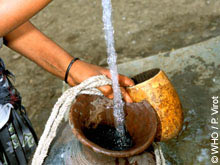 |
SOCIAL AND CULTURAL EXCLUSION, in detail:
|
 |
 |
 |
 |
 |
|
|
 |
Poverty is a multiple source of social exclusion. The poorest, homeless or living in slums and shantytowns, are excluded from many of the amenities that their societies offer. Many of those who live in better conditions do not have the resources to take part in cultural activities, practice sports, improve their knowledge, remain connected to the main events around which the bulk of social life is organised. In urban areas, poverty or unemployment often results in lesser care for children after school hours, lack of day-to-day support sometimes resulting in anti-social behaviour or, worse, delinquency.
|
|
|
In industrial countries, unemployment is sometimes a cause of social uneasiness on the part of friends who, out of awkwardness end up not inviting anymore the unemployed person who slowly slips into social exclusion. Long term unemployment also often leads to a loss of self-confidence which may even degenerate into a loss of self-esteem – which in turn leads some people to sink into despondency and further isolation. These psychological hardships increase the difficulty to find a job and lift oneself out of unemployment and poverty.
Insufficient income makes cultural events or membership fees for clubs and social outings unaffordable, depriving people from learning opportunities, remaining “socially connected”, exerting intellectual capacities, or simply enjoying life. Poverty makes books, periodicals, sports equipment or outfits, and new technologies, including the Internet, out of financial reach. Due to transportation costs, the poor and unemployed have greater difficulty moving to seek gainful employment or take part in social events.
|
|
 Often, lack of education, and the feeling that some cultural events are beyond intellectual reach prevent people from taking the initiative to make use of existing opportunities. In many countries, low income also excludes from access to health care, thus widening the gap with those who can afford health services. Poor families in rich countries are unable to go on holiday or send their children out of the city to change their minds and improve their health. Often, lack of education, and the feeling that some cultural events are beyond intellectual reach prevent people from taking the initiative to make use of existing opportunities. In many countries, low income also excludes from access to health care, thus widening the gap with those who can afford health services. Poor families in rich countries are unable to go on holiday or send their children out of the city to change their minds and improve their health.
|
|
Free or low cost access to social activities, sports, and cultural events is an essential part of a policy to fight social exclusion. But equally important are access to education, free transportation, collective sport and cultural equipment, municipal cyberspaces and other ways of connecting low-income people to the web and what it offers.
Individual action can also go a long way in breaking social barriers and isolation. Ultimately, decently paid employment and the existence of strong social links through a caring society will restore fulfilling lives to those who are affected by poverty.
|
|
|
 |
|
